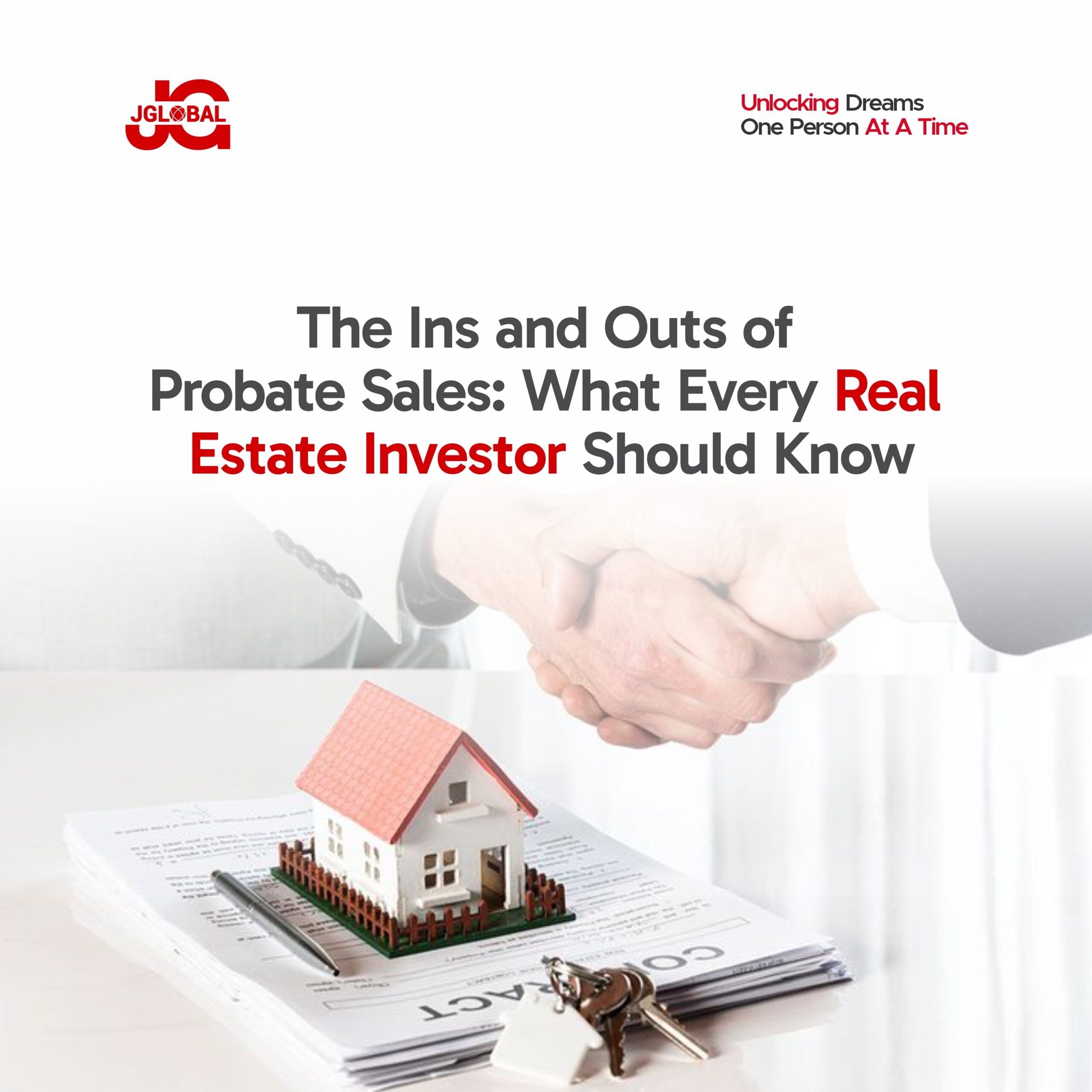THE INS AND OUTS OF PROBATE SALES: WHAT EVERY REAL ESTATE INVESTOR SHOULD KNOW

INTRODUCTION
Losing a loved one can be devastating, but when they leave behind valuable assets, the situation can become even more overwhelming. Probate sales can help overcome the legal obstacles that beneficiaries and potential buyers face when there is no will written by the deceased.
WHAT IS A PROBATE SALE?
A probate sale occurs when property is sold through the probate court system, usually after the owner’s passing. The court oversees the sale to ensure fairness and divides the assets according to the state of the deceased.
The courts take charge of selling a piece of real estate when the individual dies without a will.
Wondering how Probate sales work?
Here is a Step-by-Step Guide on how it works:
1. FILING THE PETITION
The probate process begins with the executor or personal representative filing a petition with the court. This petition requests the court to initiate probate and grant permission to sell the property. The petition includes essential information about the deceased, their assets, and the beneficiaries.
2. NOTIFICATION
After filing the petition, the court notifies the heirs, beneficiaries, and creditors about the probate sale. This notification is crucial as it informs all parties involved about the sale and allows them to participate or object.
3. INVENTORY AND APPRAISAL
The executor creates an inventory of the property’s assets and obtains appraisals to determine their value. This step ensures that the property is sold for a fair price and that the beneficiaries receive their rightful share.
For example, if the deceased owned a house, the executor would hire an appraiser to determine its value. This value would then be used to determine the sale price.
4. SALE OF THE PROPERTY
The executor lists the property with a real estate agent, who markets and shows the property to potential buyers. The agent’s goal is to attract multiple offers and secure the best possible price. Similar to selling your house, but with court oversight, the probate sale process ensures transparency and fairness.
5. COURT CONFIRMATION
Once an offer is accepted, the court reviews and confirms the sale. This step ensures that the sale is fair to all parties involved, including creditors, beneficiaries, and heirs.
6. DISTRIBUTION OF PROCEEDS
After the sale is confirmed, the proceeds are distributed among the heirs or beneficiaries. The executor ensures that debts and taxes are paid before distributing the remaining funds. For instance, if the sale proceeds are $100m, the executor would pay off outstanding debts and taxes, then distribute the remaining amount among the beneficiaries.
7. ACCOUNTING AND REPORTING
The executor files final tax returns and accounting with the court. This step ensures that the estate’s finances are transparent and that all parties are aware of the distribution.
8. DISCHARGE AND CLOSURE
Finally, the court discharges the executor and closes the probate estate. This step marks the end of the probate process. The probate estate is formally closed, and the beneficiaries can move forward.
BENEFITS OF PROBATE SALES FOR INVESTORS
1. BELOW MARKET PRICE
Probate sales often result in lower purchase prices due to the urgency to settle the estate. This benefits investors who can acquire properties at discounted rates.
2. LESS COMPETITION
Fewer investors understand the probate process, which reduces competition. This benefits investors who are knowledgeable about probate sales.
3. POTENTIAL FOR RENOVATION
Probate properties may require renovation, providing an opportunity for value-added investing. Investors can renovate and sell the property for a profit.
CHALLENGES OF PROBATE SALES
Although these challenges can be resolved with thorough research and seeking expert advice. Here are some challenges first time buyers face:
1. COMPLEXITY
Probate sales involve court proceedings, which can be complex and time-consuming. Investors must understand the legal process carefully.
2. UNCERTAINTY
Sales can be delayed or fall through due to various factors, such as disputes among beneficiaries or unforeseen issues.
3. EMOTIONAL FAMILY DYNAMICS
Family members may dispute the sale or pricing, adding emotional complexity to the process.
FINDING PROBATE OPPORTUNITIES
This answers the question of “how can I find probate properties/opportunities?”
1. COURT RECORDS
Investors can search online or visit local courthouses to find probate case filings. Public records provide valuable information about probate sales. Researching public records, can help investors identify potential probate sales.
2. ATTORNEY REFERRALS
Networking with probate attorneys can provide valuable leads on potential probate sales. By asking a lawyer for referrals, investors can gain access to off-market opportunities.
3. REAL ESTATE AGENCIES
Get in touch with Real estate agency that specialises in probate sales.
CONCLUSION
Probate sales can be a lucrative opportunity for real estate investors. Understanding the process, benefits, and challenges can help you overcome this complex market.



